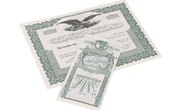Are you wondering, “I inherited stock, is it taxable?” Yes, it can be, but sometimes it is tax-exempt. Knowing when taxes on inherited stocks are due can save you problems with the IRS, later on.
Inherited stock is a nice windfall, but the taxman may or may not cometh. Whether you must pay taxes on inherited stock depends on the amount inherited, the state in which the deceased person lived, where you live, and your relationship to that individual. The good news is that most people do not have to pay taxes on inherited stock until they sell their shares.
Read More: Who Must File Income Taxes?
Exploring Inheritance Tax
Currently, 17 U.S. states have estate taxes, while some specifically have inheritance taxes. And Hawaii and Washington have the highest rates, which can be as much as 20 percent. Remember, inheritance taxes are usually paid by the beneficiaries, after the deceased’s assets are distributed.
As of 2021, the following states had inheritance taxes with these percentages taxed:
- Kentucky – up to 16 percent
- Iowa – up to 12 percent
- Nebraska – up to 18 percent
- New Jersey – up to 16 percent
- Maryland – 10 percent
- Pennsylvania – up to 15 percent
Spouses are exempt from inheritance taxes in all states, and many states exempt lineal heirs (direct descendants). In addition, some states may offer a tax exemption on certain amounts inherited.
If you are a spouse or lineal heir of the decedent, you probably do not have to pay inheritance taxes on stock even if you or the decedent lived in a state with an inheritance tax. A lineal heir is a direct descendant, such as a child or grandchild. However, if the decedent was not related to you or you had some other type of familial relationship such as cousin, aunt or uncle, you are not a lineal heir and any inheritance tax applies.
If the inherited stock shares were enrolled in an automatic dividend reinvestment plan at the brokerage, additional shares may be added after the date you inherited the stock. That cost basis differs from the basis for the actual inherited stock, so you must keep accurate records when selling the shares.
Looking at Capital Gains Tax
When you sell stock shares, you are subject to capital gains tax on inherited stock that was part of the transaction. Most times, the rates range from zero to 15 percent. But they may be as much as 20 percent for those in higher income brackets.
So, how do you calculate capital gains on inherited stock?
Well, when it comes to inherited stock, you have an advantage. If you sell stock shares you bought yourself, you must use the basis price to calculate the difference between what the stock cost at the time of purchase and when you sold it to determine your profit. That may involve a lot of record keeping and going through old files on your part.
When you sell inherited stock, the basis is what it was worth on the day the person you inherited it from died. Not only is that amount much easier to determine, but it could prove a real windfall. If the original owner held the stock for 50 years and the price skyrocketed, you’re not paying taxes on that giant increase. If you sell your shares soon after inheriting them, you may end up with no capital gains increase at all.
Considering Alternate Valuation Dates
The executor of the estate may choose to go with an alternate valuation date when filing the estate’s tax return, which is six months from the decedent’s death date. It’s not hard to find the fair market value of the shares on that date, and the brokerage can give you that information. However, six months is a long time in investment terms, and the value of the shares may have risen or dropped significantly during that period of time.
Understanding Other Reporting Requirements
Even if you don’t have to pay any tax on inherited money and haven’t sold your shares, if you receive dividend income from the stocks, you have to pay taxes to the IRS on that income. At the beginning of each year, you receive a 1099-DIV form from the brokerage with your dividend payments from the previous year.
It would be wise to consult with a CPA or tax professional in order to assess your own reporting obligations. Failure to comply with state laws could result in significant financial penalties.
References
- TaxFoundation.Org: Does Your State Have an Estate or Inheritance Tax?
- Kiplinger: 18 States With Scary Death Taxes
- Bankrate: Inheritance tax: Here’s who pays it and in which states
- IRS.Gov: Publication 551 Basis of Assets
- Cornell.Edu: 26 U.S. Code § 2032 - Alternate valuation
- IRS.Gov: Form 1099-DIV
- IRS.Gov: Topic No. 409 Capital Gains and Losses
Writer Bio
A graduate of New York University, Jane Meggitt's work has appeared in dozens of publications, including Sapling, Zack's, Financial Advisor, nj.com, LegalZoom and The Nest.

